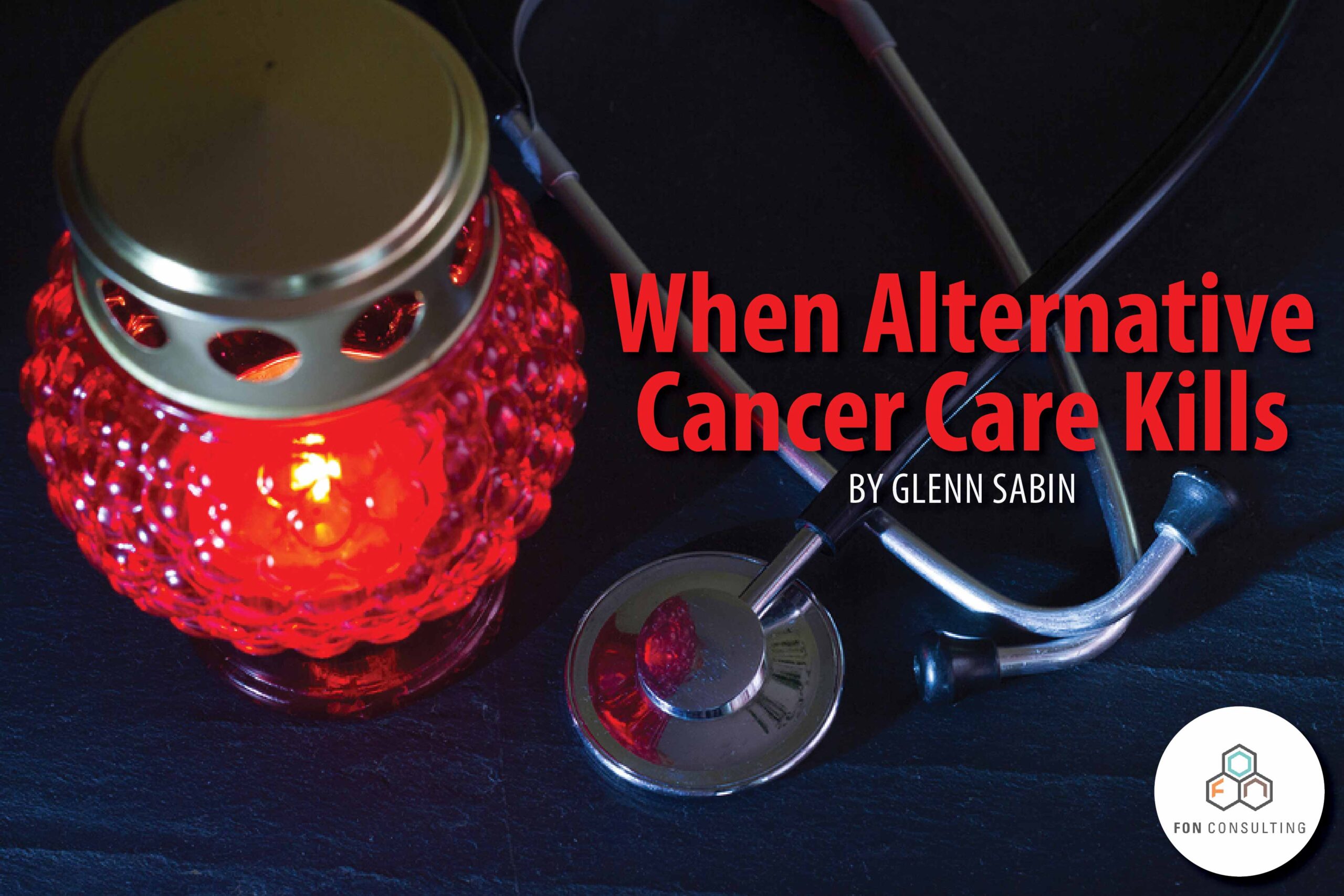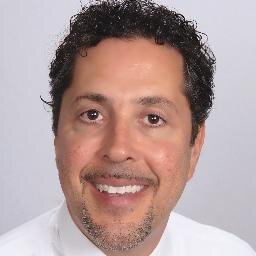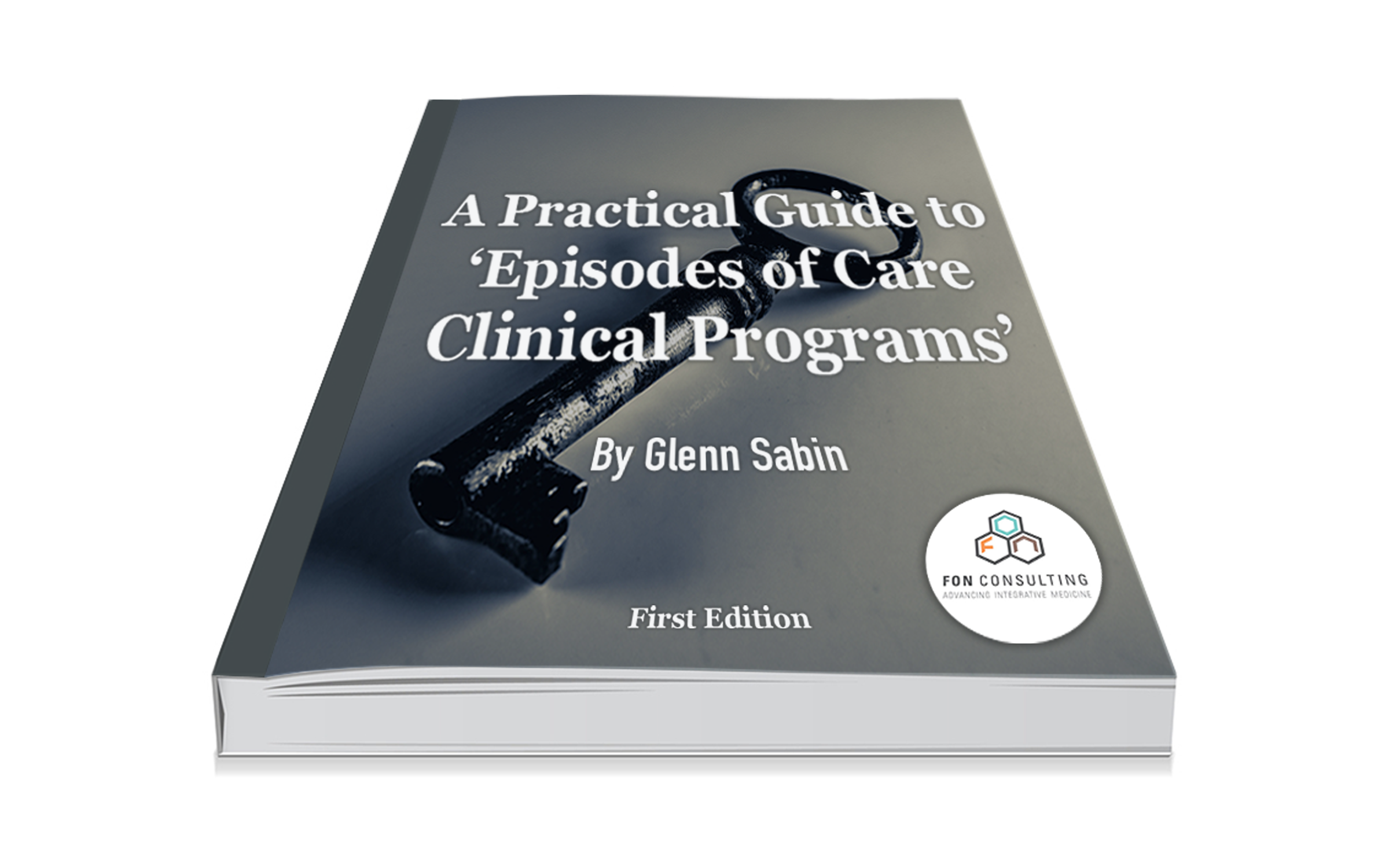When Alternative Cancer Care Kills
By Glenn Sabin

If given a cancer diagnosis, we each ultimately determine whom to trust to manage our care. We are in control of how we research, consider, and source treatment options, and the best path toward long-term survival.
Though there can be geographical access issues, financial considerations, and legal limitations to weigh, the choices are largely ours to make.
For some folks, closely-held faith-based or spiritual beliefs influence the type of care they accept in order to manage their cancer journey.
For others, unmitigated fear from having witnessed a friend or family member succumb to the disease—often after undergoing challenging conventional treatment and the accompanying deleterious side effects of that treatment—can also affect decision-making.
Tragically, many people do not fully understand the complexities of their diagnosis, prognosis, and treatment options.
Worse still, those newly diagnosed with cancer are regularly told they need to act quickly, and begin treatment immediately—within days or weeks—to get their cancer under control. This happens even though many cancer diagnoses require neither instant decision-making nor immediate treatment.
But perhaps the largest and most dangerous influence on cancer treatment decision-making is the unending supply of conflicting content and advice provided through ‘cancer cure’ articles, videos, summits, and chat rooms.
Whether patients refuse standard conventional cancer treatment or opt for other modes and methods of ‘cure’ and healing, the fact remains that their exposure to content that is poorly sourced and ill-informed (at best), or maliciously crafted and disseminated (at worst), impedes intelligent decision-making.
Decisions made based on such content can, and do, lead to harmful and even fatal consequences. Because alternative cancer care can kill.
A search using Dr. Google returns nearly a googillion articles and accounts of miracle alternative cancer cures. These same pieces also ridicule conventional therapies for their toxicity and ineffectiveness.
It often seems that ‘the truth about cancer’ and alternatives for achieving deep healing, or absolute cure, is as close as a few keystrokes; or an airline ticket away from an obscure clinic in another corner of the world.
With the landscape of information and misinformation resembling the Wild West, it’s vital for people to be able to differentiate between high-quality cancer resources and those that may be harmful to their particular situation.
To be sure, navigating a cancer journey, or caretaking and advocating for someone who has been diagnosed, is almost always a steep and overwhelming learning curve.
Like I said, we are largely (but not exclusively) in control of our own health, including the critical decision-making around cancer care. So, if someone refuses standard treatment for a particular non-metastatic cancer (disease that is local and has not yet spread) that is proven to be highly effective and often curative, that’s his or her right.
But this is often a mistake that can and does unnecessarily lead to premature death.
A Yale study was recently published in the Journal of the National Cancer Institute (JNCI), titled ‘Use of Alternative Medicine for Cancer and Its Impact on Survival’. It’s been getting a lot of attention, both in the general media and shared across social media.
The study design is not perfect—a topic for a later date—but the underlying foundation of the study, its core premise, offers important lessons and deserves closer inspection.
The investigators looked at 560 patients who received conventional cancer treatment—defined as chemotherapy, radiation, surgery, or hormone therapy—and 281 patients who refused conventional cancer treatment in favor of alternative medicine. The study focused on breast, lung, colorectal, and prostate cancers.
According to the investigators, the ‘alternative medicine group’ tended to be younger, contained more females, and had more education and affluence than the control group of patients receiving standard care.
The alternative medicine group included only those with non-metastatic, stage I or II disease, essentially cancer that was localized and had not spread. These people had opted out of largely effective and curative treatments to go it their own way. As a result, according to the paper, many unnecessarily experienced untimely deaths.
By The Numbers
According to the study methodology, those choosing alternative medicine over standard cancer care for disease considered curable, had poorer outcomes, and were over twice as likely to die prematurely. Specifically:
Breast Cancer: Fivefold increase
Lung Cancer: Twofold increase
Colorectal: Fourfold increase
Prostate: No statistically significant difference in risk of death between surgery, radiation or hormones versus active surveillance at 10 years. This is not surprising for lower grade, typically slower-growing prostate cancer. It is why active surveillance—observing the course of disease in lieu of immediate treatment—has become standard care.
The authors of this study did not define the alternative treatments used. This was a missed opportunity, as alternative treatment can include a vast assortment of interventions, including myriad forms and flavors of quackery. However, the authors positively acknowledged some well-known, supportive complementary and integrative medicine approaches such as acupuncture and massage.
My History
Those who have not read my book, n of 1, often confuse my own refusal of chemotherapy for chronic lymphocytic leukemia (CLL) with being a proponent of alternative medicine, or a staunch opponent of chemotherapy (which, technically, includes all ‘chemical therapies’). Nothing could be further from the truth.
I espouse evidence-informed integrative oncology: modern oncology diagnostics and therapies combined with lifestyle change and other supportive therapies.
This integrative approach, NOT the alternative approach, supports patients undergoing active treatment, can help ensure deep and durable remissions, and is also used to control disease progression when complete remission is not possible.
Specifically, I’m talking about daily things like physical activity, an unprocessed and primarily plant-based diet; social interactions; stress reduction techniques; restorative sleep; plentiful filtered water intake; well-informed, high-quality dietary supplements; and additional adjuvant therapies, as reasonably indicated, to help achieve the best outcomes.
I successfully managed my CLL—a chronic, typically slower-growing disease that did not require immediate therapy—with nutrition, physical activity, stress reduction techniques, and a host of additional interventions heavy in sensible lifestyle choices.
As attested in the peer-reviewed and published clinical case report that chronicles my personal medical narrative, I am a champion of food as medicine, and advocate the power of diet, exercise and stress reduction to influence the prevention, and control, of cancer.
Had I been diagnosed with a type of cancer typically requiring more immediate conventional care, things might have gone a different way.
Enjoying this article? Subscribe and get our latest, delivered straight to your inbox.
The fact is, people with slower-growing, more indolent chronic disease—even those considered incurable—have advantages that others with more aggressive tumors do not. Essentially, they have more options to become healthier ‘thrivers’ prior to ever needing treatment.
Some examples of chronic but largely incurable diseases are CLL, small lymphocytic leukemia, and follicular non-Hodgkin’s lymphoma. Another slow-growing disease is indolent prostate cancer, which does not require immediate therapy, much like the above mentioned blood diseases.
All of these slow-growing cancers typically fall within the ‘active surveillance’ or ‘watchful waiting’ category. No treatment upfront; just wait and watch until treatment may be required. I much prefer the term ‘proactive observation’.
This sensible approach of proactive observation gives those affected with chronic disease, even ‘incurable’ disease, an opportunity to unleash quality lifestyle choices to positively impact their disease course.
This group is not risking their long-term survival because they are being closely monitored. They did not refuse recommended therapy offered with curative intent.
If the medical literature clearly backs a conventional care protocol, and it is offered with curative intent, I always support this approach. This assumes the patient is considered to be nutritionally, physically, and emotionally able to withstand the often deleterious effects of conventional cancer care.
However, there are many instances when preserving one’s quality of life absolutely outweighs the notion of weathering heavy treatment. This is often the case for older, frail people, even with non-metastatic and often curable disease.
When I coach a cancer patient who tells me he or she is refusing standard care, including chemotherapy or radiation therapy for a non-metastatic localized disease, I point the patient to the clinical guidelines to review the standard care options—and the literature that supports these recommendations. I make sure my client completely understands the science.
Unless you have a slow-growing, chronic disease that does not require immediate treatment, you are taking a big gamble on eating, exercising, or supplementing your way to becoming cancer-free.
I am not suggesting this is an impossible feat, and has never happened, as I am a testament to these types of radical remissions. But I do feel it is incredibly irresponsible for those who guide cancer patients in refusing the so-called toxic therapies in favor of depending solely on food-based therapy, supplementation, or choosing any number of other combinations of agents or interventions.
For those with local, non-metastatic disease who are otherwise healthy enough to undergo conventional treatment with curative intent, this is almost always the best option.
Protect The Host at All Times
Most often I advocate standard treatment, but with a focus on protecting the host environment. The disease is the tumor(s). YOU are the host.
The host tumor microenvironment, which includes normal tissue and cells, can influence whether cancer cells thrive or die. Augmenting conventional care with evidence-informed integrative oncology and lifestyle approaches is powerful and, in my view, today’s most pragmatic and effective course toward more personalized care.
Reduction in conventional treatment side effects improves quality of life and can allow patients to stay on course with the recommended treatment schema without breaks. Limited interruptions in treatment can mean more favorable outcomes. A healthy host anti-cancer environment may contribute to longer, more durable remissions, or longer periods of disease-free progression when complete remission is not possible.
Future Exploration of the Host Environment
The sad truth is that few precise, predictive tests exist to determine why different people with the same category of disease, and same general staging and grading, can have entirely different outcomes after undergoing similar treatments. One exception is the genetic assay OncoType DX, which, for certain early stage invasive breast cancer, predicts response to chemotherapy and chance of recurrence.
It is unknown why one survivor goes on to have incurable metastatic disease, while another maintains a more durable, long-term remission, but this phenomenon may directly correlate to the host tumor microenvironment of the person with cancer.
So much attention and money has been spent on treating tumors directly that it is only recently we’ve begun developing therapies that affect the host environment. Immunotherapies, including the newly FDA- approved CAR-T gene therapy (the first of its kind), are designed to arm the immune system, supporting the host environment to decimate cancer cells.
Once scientists gain a clearer understanding on each individual’s host environment, and can better predict the likely course a disease will take, the standard care for each patient will be individualized. This will set standard care on its head. There will be a lot less over-treating of over-diagnosed cancer at various stages of disease.
Many malignancies, especially those caught early—and treated aggressively today—will fall under active surveillance. One day, hopefully soon, it will be known which patient can forego standard care, or certain aspects of standard care, based on each patient’s unique host environment, and upon disease mutations.
Then, perhaps, more people—monitored over time—will be further motivated to clean up their diet and double-down on lifestyle change—a perfect and safe opportunity for those affected to positively impact their health.
Meanwhile…
Those Refusing Standard Care
For those insistent on pursuing alternative cancer care for ‘curable’ non-metastatic disease, metastatic disease, or even relapsed disease, I have one piece of advice: While you pursue alternative methods in lieu of standard care, make sure to measure your response to treatment. Work with an oncologist willing to see you for exams, imaging, and lab work.
Do not put all your faith in your alternative healing partner(s). In other words: trust but verify. Determine which biomarkers, blood tests, imaging or other tests will be used to determine how the outcomes of your chosen course of care will be tracked and measured. Tracking provides the opportunity to reconsider standard care options if you are not achieving the results you were hoping for.
In the event that a remarkable outcome is achieved, here are several options to have your clinical journey chronicled in the medical literature, and to support the scientific understanding of the alternative choices you pursued.
Your Life. Your Choice.
Cancer treatment decisions and healing approaches are yours to make. But it is best to do so when armed with all relevant data points in-hand, including the science and statistics.
In summary I am not a physician, but have learned what it takes to personally confront cancer. It is my view that every patient and survivor, interested in pursuing an integrative approach to care, is best served by working with a top-credentialed conventional oncologist—with expertise in a particular disease—along with a seasoned integrative cancer specialist, to help round out the care team. In some cases, this may be one provider—an experienced integrative oncologist.
This combination of expertise will assist you in determining the impact—favorable or unfavorable—a particular treatment may have on the disease. Critically, it will help you avoid missed opportunities or missed downturns that may influence your survival.

Read Glenn’s story.





















